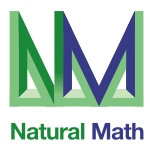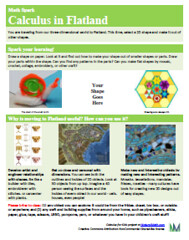Calculus for 5-12 yo (grown-up workshop) on March 2, samples to try, shenanigans: Newsletter February 26, 2016
Subscribe and read archives
Pinterest | Twitter | Facebook
Inspired by Calculus on March 2
We had a lot of requests to repeat the Inspired by Calculus online workshop for parents, teachers, and their children ages 5-12. We will run another session with three live meetings, starting March 2. Check it out!
We’ll have a calendar of all upcoming courses very shortly. Please stay tuned.
What do you get from Inspired by Calculus?
- A highly interactive experience where you make models, talk, and collaborate with other parents and teachers. There are only 25 spaces in the course.
- Leading your children or students on playful math adventures.
- The first meeting in a math circle format (you as a student!) to see how to run these activities, and to get inspired.
- A day to try activities with children and friends
- The second meeting to answer your questions, overview other activities, and prepare to do them with children.
- Three weeks of mentoring and peer discussions on the forums.
- The third meeting to recap, ask more questions, and stay inspired by calculus!
- A dozen reference cards (math sparks) to help you try out the activities with your children.
- Access to the Natural Math online forum to ask questions and share resources, even after the class is over.
- Most importantly, you’ll get the confidence in your own ability to do math differently in your family!
Go to the course page to try two short, sweet math spark activities with your children, and learn more about the course.
Socks Are Like Pants, Cats Are Like Dogs… Wait, what?!
The pre-orders and crowdfunding prizes are on the way, and our new book that makes bold claims about similarities between different things is out! Get the new preview of the book, read the intro on how to play algebra with children, and then try two activities from the preview:
As always, this book is Creative Commons and name-your-price PDF is available.
Discussion Group Shenanigans
Once in a while, when a new member joins our FB discussion group ‘1001 Circles’ we make a number theory greeting card like that. Every number has cool features. Every one!

And every Monday is a PunDay. From this week:

But mostly, the 1001 Circles group has discussion about family math and mathematical circle activities. Check it out. We have plans to produce digests of discussions – if you’d like to help, let us know.
Dr. Maria Droujkova and the Natural Math crew
![]()
Questions? Email reach.out@naturalmath.com or ask in comments to this page.
Posted in Make & Grow, Newsletter
Inspired by Calculus online course: Newsletter February 1, 2016
Subscribe and read archives
Pinterest | Twitter | Facebook
Join Inspired by Calculus: Online course for parents, teachers, and their children ages 5-12
- What: An intensive three-week online course on calculus for young children
- Why: Learn how to help your children play with rich and beautiful math.
- Who: 25 parents, teachers, math circle leaders, and their children, with Kalid Azad and Shelley Nash as organizers
- When: Live meetings February 5, 6, and 27 at noon EST (New York)
- Where: Online video-talk software Zoom (similar to Skype)
- Price: Registration is $40. Work-trade stipends are available upon request.
- Supplies: Paper, markers, scissors, glue, tape, building blocks
Sorry, the course is full. Sign up for the waiting list, or check out the self-paced Multiplication Explorers!

We are running a three-week online workshop for 25 parents, math circle leaders, and teachers with their children ages 5 to 12.The goals of Inspired by Calculus are to help adults develop their own math intuition, to see the joy and beauty of math (especially Calculus), and to help adults develop the confidence to try out calculus activities with their own circle, family, or class.
Let’s Explore!
Calculus is usually presented as a tool for engineers and physicists. It misses the bigger picture: Calculus is a point of view that helps you see everyday objects, from a humble banana to a flipbook, in a new light. Imagine having “X-Ray” vision, where you can look at any shape and see how it was put together. Or, practice your “Time-lapse” vision and learn to predict how shapes will change in the future, like peeking ahead in a flipbook. These analogies provide more insight than years of dry textbooks, and can be enjoyed by children and adults alike. Join us to play and explore a new point of view!
Here’s how it works:
Adults meet twice in a webinar format at the beginning of the workshop (Feb 5, 6th). During the first workshop, our goals are to become familiar with Natural Math methods and activities and to explore in the context of Calculus. You’ll be introduced to Math Sparks and you’ll try them out live!
Between the first and second workshop, you will try out a math activity with your group of children or students. We want you to bring your experience back to the second workshop. Bring the successes, the challenges, the struggles, whatever happens we want to know!
The goal of our second workshop is to give you the support, feedback and confidence you need to try out even more math sparks on your own. We will discuss your experiences and share feedback and ideas with one another.
After the initial two workshops, you get to explore with your family, students, or math circle! For three weeks try to dive into our support materials and discuss your experiences in an online forum. You can try as much or as little as you like. Kalid and Shelley will be actively answering questions in the forum and you are encouraged to share your experiences and help others, too!
The last workshop (Feb 27th), we’ll wrap up the experiences, and our goal is to be sure we have all gained in our confidence and abilities and love of math, too! The support materials and forum will always be available to you even after the close of the live workshop session.
Want to make a difference for your children and see mathematics in a new light? Join this new Natural Math adventure!
Here is a sample of our Math Sparks. We’ll have Sparks like that to go with every activity. The goal is to start thinking about ideas – to spark curiosity. Click to see the full-size PDF and ponder the questions in it.

 Kalid Azad is an extremely curious person who loves sharing insights with others. While studying Computer Science at Princeton University Kalid started a site to explain concepts as he would have liked to learn them. BetterExplained is a continuation of that idea. The book Math, Better Explained is a well-received Amazon bestseller.
Kalid Azad is an extremely curious person who loves sharing insights with others. While studying Computer Science at Princeton University Kalid started a site to explain concepts as he would have liked to learn them. BetterExplained is a continuation of that idea. The book Math, Better Explained is a well-received Amazon bestseller.
Shelley Nash is the homeschooling mom of seven amazing and challenging kids ages 13 to 1. For over 20 years, she has been driven by an insatiable desire to understand learning, education, education’s role in our society and personal development, and the role of technology in learning. She is passionate about letting children own their education and learning, and about discovering the elements that inspire learning in all of us.

Bridges is one of the seven Natural Math main principles, and the focus of this class. Bridges connect and unite. In the class, you will learn to link math ideas to one another, math to other human endeavors, and people to math-rich communities. Connections help us to make sense of math, and to use math to make sense of life.
A video message from Maria Droujkova: 5 year olds can learn calculus
This is a presentation the founder of Natural Math gave at a SparkCON festival, building on 5 Year Olds Can Learn Calculus article in The Atlantic. It’s a short and fast-paced intro to what Natural Math is all about, and to calculus with young children.
A video message from Kalid Azad: calculus in 1 minute
Calculus is a special way of understanding the world. In this video, I give a 1-minute intuitive overview of what calculus is all about.
A letter from Shelley Nash
Hello!
Is math a struggle at your house? Do you want to do it differently? Do you want it to be fun? Profound? Joyful? Do you want to know why this subject is so important beyond balancing your checkbook?
After reading Mathematicians Lament about how we kill the joy in math, I’ve wanted to teach math differently and use more discovery and interaction. But since I didn’t learn math this way, it has been really challenging to figure out how to do it this way. I have felt silly, or like I’m groping around in the dark. I’ve realized that I have never really “done Math” in the sense a mathematician uses the word, and reading about how to “do math” isn’t enough. So I never did much differently. I bought lots of books and read about doing different, but I still really didn’t know how it should “look!” Then I found mentors at Natural Math.
When you first start this mathematical journey, it can feel like embarking to a foreign land. A mentor helps you see the way, but a group of peers encourages you to keep going and to gain confidence in your abilities. Sharing with others will comfort you that your struggles and feelings are a normal part of the process. With others you can find more diverse ways of thinking about math and you can share ideas with others about how this new way of doing math is looking in your home. When you are connected to other families or groups you can make more lasting changes to your learning practices.
What do you get from Inspired by Calculus?
- A highly interactive experience where you make models, talk, and collaborate with other parents and teachers.
- Leading your children or students on playful math adventures.
- The first meeting in a math circle format (you as a student!) to see how to run these activities, and to get inspired.
- A day to try activities with children and friends
- The second meeting to answer your questions, overview other activities, and prepare to do them with children.
- Three weeks of mentoring and peer discussions on the forums.
- The third meeting to recap, ask more questions, and stay inspired by calculus!
- A dozen reference cards (math sparks) to help you try out the activities with your children.
- Access to the Natural Math online forum to ask questions and share resources, even after the class is over.
- Most importantly, you’ll get the confidence in your own ability to do math differently in your family!
Questions? Email reach.out@naturalmath.com or ask in comments to this page.
- Connection and devices: you will need fast internet to watch and listen. It’s better to have a microphone and a webcam so you can show and tell as well, but you can also use text chat. We recommend larger screens rather than phones.
- Software: Zoom is a tool for talking, like Skype or Google Hangouts. Please download and try it, here: https://zoom.us/test The same page has the link to a tech support center, in case you need it.
- Recording: The meetings will be available as YouTube videos.
Posted in Make & Grow, Newsletter
Poetry and Graphing Lines
I recently struggled to understand limits in Calculus. One math problem in particular made me really unsure of what I was doing.
I ended up asking Maria to help me understand the limit as x approached infinity. As she and I played around with similar graphs and functions on the graphing site Desmos.com, I began to see patterns and the graphs were so beautiful! I was filled with a joy that math can be so playful and inspiring, and I had these bits and pieces of thoughts running through my mind.
So, I took those bits and made a poem. I hope you enjoy it!
graphing lines
coming together
to show the tension and grace
Of their powers.
the exponents pulling, pulling
forming an entirely new shape.
The struggle of powers
Births a new creation
of beauty, grace, and wonder
all it’s own.
graceful, fluid, moving
now toward infinity, now away
now toward zero, now away
but it can never arrive.
there are limits to its
powers, curves and grace—
even empty spaces at times.
what a beautiful pattern
of numbers, space, and time.
what lovely art and joy.
Graphing Lines.
Posted in A Math Circle Journey
Easy Complexity and Special Snowflakes: Newsletter January 21, 2016
Subscribe and read archives
Pinterest | Twitter | Facebook

If you are a parent or a teacher reading this, you probably want to offer math activities that are full of joy and beauty. It may sound simple when you read blogs or books – a child’s play. Yes, give children blocks or patterns to play and have fun, use a few math words along the way, ask a question or two, and voila! – you have an amazing math adventure for your students or family!
The reality is often different. Our dark math past may hold us back from playing. Even if we manage to organize an open, joyful activity, we have this nagging feeling that it’s not advanced enough, not deep enough, not hard enough. If it’s not difficult and a bit painful, is it even real math?
This two-day online math circle will help you learn how to deal with both dangers. First, we will offer activities that can get you playing, give you the much-needed sense of ease. Next, you will learn to ask great questions and find bridges to more complex explorations within these now-familiar activities.
Talks and blogs
Since we announced the 1001 Circles Facebook group in our previous newsletter, it’s been lively and energetic. There are 530 members as of this writing. If you use Facebook and are interested in family math and math circles, join the group. If you prefer longer posts, here are two thoughtful stories sparked by the conversations in the group.
Sue VanHattum at Math Mama Writes blog has a post titled, Does your kid hate math? Try a new angle:
Long before I became a parent, in my teaching (of community college students), a number of them told me how bad they were at math even though their mom or dad taught it. I figured the parents pushed too much or something. (Blame the parents much, do we?) I ‘knew’ I wouldn’t do that.
Well, I don’t think I pushed. But my son hates math, and is consequently way behind his peers. (He unschooled for years and there was no ‘behind’. But he chose to go to a regular middle school this year, where the other kids have mostly had the standard schooling.) So when two people I respect got into a meaty conversation about this, my antennae popped up.
Yelena McManaman at Duct Tape Rocket blog shares her thoughts about a discussion of renewed math wars, started by James Tanton:
James uses an example of subtraction with borrowing. Before I get to that, I’m going to give an example of addition with carry.
237+56=?
Simple enough, right? Applying the standard algorithm, a child would re-write this, placing 56 under 237, then add starting with units, then tens, then hundreds, arriving at the answer = 293.
That’s how I was taught. And that’s how I’ve been doing it for many years except… Ok, I’ll return to the “except” part in a second.
For Rocket Boy, however, “standard algorithm” is the least effective. Because of his neurological condition, writing is hard for him and writing neatly is impossible. And writing one number under another, aligning units, tens, hundreds falls into the impossible category. So he figured out his own way of doing addition, relying on mental arithmetic and working his way left to right.
… except… I also add left to right whenever I don’t have pen and paper in front of me. Which is most of the time.
Dr. Maria Droujkova and the Natural Math crew
![]()
Posted in Make & Grow, Newsletter










